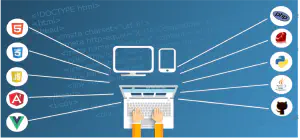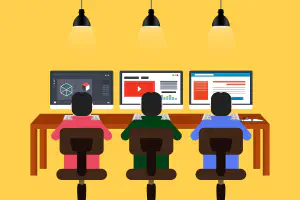Is it worth to learn programming? (in 2022)

It seems like everyone and their mother are trying to learn programming. Most of the motivation for such en devour is fueled, in my opinion, by media hype.
There seems to be a prevailing opinion that learning programming is easy. You just need to go through a few weeks boot camp, watch a couple of courses and bang!… You land a job at Google or Facebook, making millions.
Unfortunately, when reality sets in, many people get frustrated, discouraged and finally quit. They realize it’s not that easy as media makes it to be, and conclude that it’s not worth the effort.
In this post, I’ll try to shed some light on the whole process of learning to program and is it worth the time and effort.
Table Of Contents
Is it worth to learn programming?
This is the question many aspiring software developers are asking. By worth, I here assume they mean worth financially. And simple answer is yes, it is definitely worth to learn programming to improve your financial standing.
Software developers consistently command much higher than average salaries across the world. Of course, salaries depend widely on location, seniority and field they work on, but the average salary is much higher than average of the other industries.
In addition to salary, programmers generally enjoy many perks that are rare in other industries. For example, flexible hours, remote work and company sponsored learning opportunities are almost standard in software development companies. Plus, shortage of skilled engineers is so serious that tech companies come up with new perks every day to attract top talent.
So, TL;DR; version of this article is: yes, it is financially worth a lot to learn programming.
What is the total cost of learning programming?
While many people ask if it is worth to learn programming, they are not asking the question correctly. The right question would be:
Is it worth to learn programming, considering the time and effort required to learn it, and considering the possibility that you may never be good at it or even be able to get a job?
With this formulation, we can look the question from different perspective. We take cost into account. By cost, we assume actual financial cost and opportunity cost.

Consider total cost of learning to program
Financial cost is what you actually spend on resources to learn programming . These can be books, courses, equipment, tutors, mentors and other stuff you pay for directly.
Opportunity cost is much more difficult to estimate, but is what people actually have in mind when they ask if programming is worth learning. They want to know if spending months or years of their life learning something will yield desired results, or it would be better to focus their time and energy on something else.
In the rest of the post, I’ll try to dig into this a little deeper.
Things to consider before you start learning to code
Let’s face it: programming is not for everyone. Despite how much media would like to convince you that coding is the new literacy , I believe it is far from the truth. And no matter what you see in movies, programming is far from easy.
So, before you dive in head-first into programming, consider these points:
Do you actually like programming?
If you ask any person wanting to learn programming if they like, they will probably say something like “Of course, I love programming, problem solving, fiddling with computers an all that”. And they probably mean it.
But, many of these people don’t really like programming. They like the IDEA of programming.

Many people like the idea of programming
And what’s not to like? The first thing that pops into people’s heads when they think of programmers is goofing around the office, playing video games and ping-pong. Add to that excellent salary, benefits and perks, and you got a dream job.
The reality is that programming is hard. It is extremely mentally taxing and requires a lot of focus and perseverance. This also goes for the process of learning it.
Make no mistake, you will hit a roadblock after roadblock during your learning journey. You will feel angry, frustrated and stupid. I know, I’ve been there. But, the key is to grind it out.
This is where the part of you actually liking programming comes in. If you really like it, you will keep trying again and again, until you crack it. If you don’t, there is high chance that you will just quit and try something easier.
Do you like learning new things?
This is another important point to consider. If you are serious about having a career in software development, you are in for a lifetime of learning.

Learning new things is essential for programmer
There are a lot of technologies in the world of software, and you need to learn a lot of them for even the simplest job. And you can’t become complacent. If you don’t keep your skills up to date, you will be run over by younger and more eager coders.
The good side of this is that every new technology is based on existing one, so once you know the basics, learning new things is not really difficult. This goes for programming languages, libraries, framework and tools.
So, think about this. If you are a person who enjoys learning new things and building side projects just to learn, then you are on a good track. Otherwise, you may want to rethink if programming is the right path for you.
Can you handle the stress of job hunting?
The hardest part for self-thought programmers is getting that first job . It is hard even for university graduates, let alone if you are self thought. Many people send hundreds of job applications before getting hired, and many give up before getting the job.
This is just the harsh reality. For every entry level position, companies get hundreds of applications. They can get picky and contact only the applicants they like. But, getting no replies to their applications tends to make people disappointed.

Landing first programming job is tough
Ask yourself, can you handle applying for hundreds of jobs and not getting any feedback? Can you handle the failure on interviews even if you think it is a sure thing? Are you ready to accept that you will not be able to get a programming job at all?
Managing expectations and being realistic is important. If you expect that you can learn programming and get a job in a few months, you may be in for a rough awakening. Granted, there are people who manage to do it, but there is always some kine of background story behind these success stories.
Here, I will again touch the fact that you need to like programming and learning new things. Because, even if you can’t manage to get a job, you can have a sense of accomplishment since you learned something new and valuable.
Don’t bet the house on learning to code
Looking at social media and programming forums, you can see a lot of posts like “I have no skills, no education, no career. Learning programming is my only way out”.
This is wrong on so many levels. Programming is not some magic wand that will solve all your problems in a blink of an eye.
It takes time and grit to learn something as complex as programming. If you are looking for a quick fix, then I’m sorry to say, but you’re on wrong path.

Programming is not the answer to all your problems
Although I encourage everyone to try learning to code, it is definitely not for everyone. Especially if you are struggling financially, you may want to avoid putting all your eggs in programming basket.
There are other skills you can learn in much shorter time span that will give you financial stability. Although they may not be as sexy as programming, they can improve your life significantly.
Final thoughts
Please don’t take this post as an attempt to discourage you from learning programming. It is intended as a reality check to address some of the concerns beginners may not even know they should be thinking about.
If you want to learn programming, just go ahead. It is a wonderful and rewarding profession. But, please don’t give in to media frenzy trying to convince you it is a piece of cake. You have some serious work ahead of you.
I would really like to hear your thoughts about this topic. If you have any feedback, please don’t hesitate to comment.


